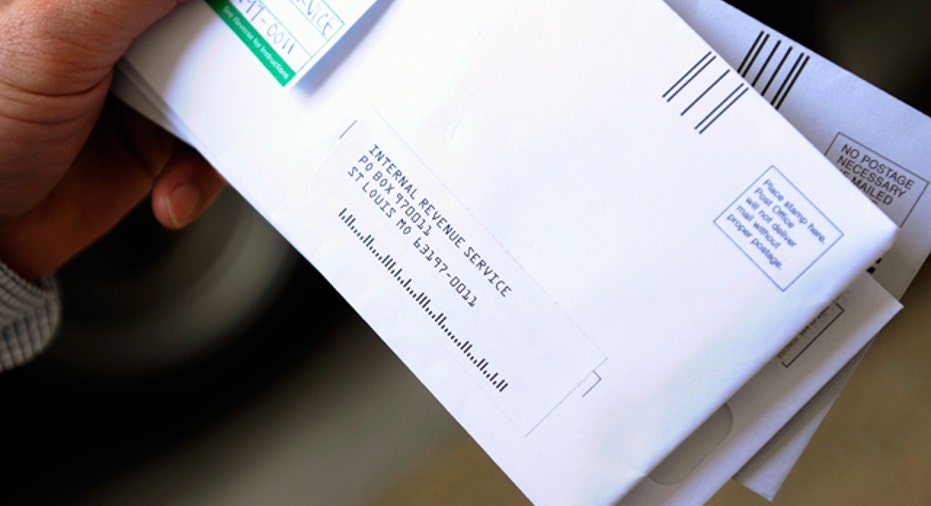What If I Can't Pay My Tax Bill on Time?

We’re at the end of March, and tax time is just around the corner. As a result of a holiday falling on April 15th this year, taxpayers have a few extra days to get their paperwork together and file with the IRS. April 18th is the deadline to file your 2015 returns.
Brian Ashcraft, regional director of Corporate Stores at Liberty Tax Service (www.libertytax.com), shared with FOXBusiness.com these last minute tips for filing your 2015 tax return.
Boomer: Do I have to pay taxes on my Social Security income?
Ashcraft: Taxpayers who have substantial taxable income, such as wages, self-employment, interest, dividends, in addition to their Social Security benefits will have to pay taxes on their benefits. Up to 85 percent of your Social Security benefits can be taxable.
Boomer: What can I do if I owe money but can’t pay?
Ashcraft: File your tax return on time. That is the most important thing you can do if you owe the IRS. The IRS charges penalties for filing late. The IRS also charges daily interest on unpaid tax bills, so the longer you wait, the more interest you will owe. Failing to file a return can result in non-filing fees that will be added to other fees and will increase the amount you owe to the IRS.
Fortunately, the IRS offers payment options for taxpayers who cannot pay the taxes they owe. Each option has different requirements, and some have fees.
Taxpayers who need to make monthly payments, can request an Installment Agreement when they file their tax return. The Installment Agreement sets up a fixed monthly payment. It is a formal agreement that includes an application process and fees.
Taxpayers who are unable to pay off their debt in full may consider an Offer in Compromise (OIC), which allows the taxpayer to pay less than the full amount owed. To be considered for an OIC, the taxpayer must submit an application, pay certain fees and a portion of the debt. The taxpayer must file tax returns and make payments on time for five years after the IRS accepts the offer.
Boomer: What tax credits can seniors take?
Ashcraft: Medical and dental expenses are often the largest expenses for seniors, and some are deductible, including health insurance premiums, some Medicare premiums, long-term care insurance premiums, prescription drugs, nursing home care, and most other out-of-pocket health care expenses. To deduct medical and dental expenses, taxpayers must itemize their deductions using Schedule A. The expenses are subject to a limit of 7.5% of the adjusted gross income (AGI) for taxpayers 65 and older.
A great way to earn money when you retire is through interest, dividends, and capital gains from investments. Dividends and capital gains are taxed at lower rates than ordinary income, ranging from 0% to 20%, depending on your overall income tax bracket. Unlike income from a job or business, this income is not subject to Social Security or Medicare taxes. Fees you incur for investment advice or accounting services are deductible to the extent they, along with your other itemized personal deductions, exceed 2% of your adjusted gross income (AGI). You cannot deduct fees you pay to a broker to acquire investment property, such as stocks or bonds. You must add the fee to the cost of the property and recoup your expenses when you sell.
Charitable contributions are a way to give back and receive a tax deduction. Cash contributions of up to 50 percent of your adjusted gross income (AGI) are deductible each year as an itemized deduction. You must file Schedule A to include your charitable contributions.
Higher Standard Deduction: Taxpayers 65 and older by Dec. 31 of the tax year are entitled to a higher standard deduction. A taxpayer can claim the higher deduction if they or their spouse is older than 65 and they file a joint return. The standard deduction applies only if the taxpayer does not itemize.
Boomer: Is my Medicare premium tax deductible?
Ashcraft: Yes, seniors enrolled in Medicare can count premiums for Medicare Part B, Part C, and Part D coverages as medical expenses. Schedule A is used to deduct medical and dental expenses on your tax return. The expenses are subject to a limit of 7.5% of the adjusted gross income (AGI) for taxpayers 65 and older.
Boomer: Any last-minute tax tips for Baby Boomers?
Ashcraft: Always review your tax return, whether it is self-prepared or professionally prepared. Look for typos or incorrectly entered data.
Max out retirement investing opportunities.
Do not, unless absolutely necessary, take an early withdrawal from a retirement account. This can be a big tax mistake. If a taxpayer takes money from a retirement account before age 59½, the taxpayer will be taxed on the withdrawal amount and will incur an additional 10 percent tax on the amount withdrawn.
Thinking of your hobby as a business may be a problem. Boomers frequently run afoul of IRS "hobby loss" rules. If you take a loss on a business for more than three years, the IRS considers your enterprise a hobby, which makes it ineligible for preferential tax treatment.



















